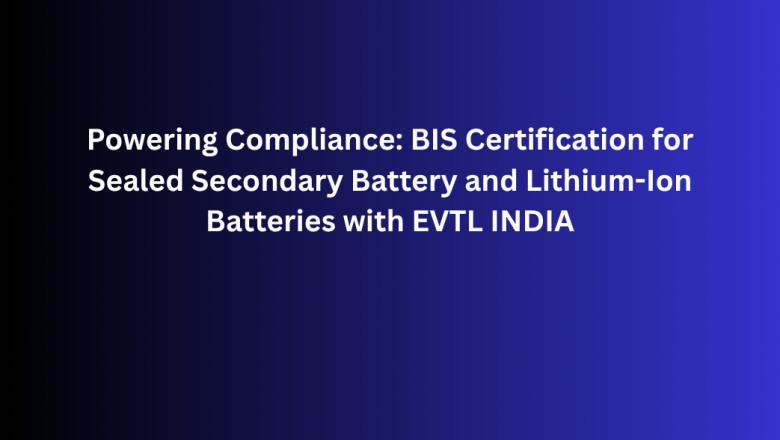views
In a world increasingly dependent on portable power solutions, the demand for high-quality and safe battery technologies is more important than ever. The Indian government, through the Bureau of Indian Standards (BIS), has made it mandatory for certain battery categories to comply with safety regulations under the Compulsory Registration Scheme (CRS). Among these are sealed secondary batteries and lithium-ion batteries, which fall under the Indian Standard IS 16046 (Part 2):2018. Obtaining BIS Certification for Sealed Secondary Battery and BIS Certification for Lithium-Ion Battery is essential for manufacturers and importers aiming to access the Indian market. EVTL INDIA, a leading consultancy firm, provides end-to-end assistance as a trusted BIS CRS Consultant, ensuring seamless and timely certification.
Importance of BIS Certification for Sealed Secondary Battery
Sealed secondary batteries are widely used in devices ranging from mobile phones and laptops to backup power systems and electric vehicles. Given their critical role in modern technology and the potential risks of malfunction or fire, ensuring their safety is paramount. The BIS Certification for Sealed Secondary Battery is a mandatory requirement under the BIS CRS for Lithium-Ion Battery, applicable to manufacturers and importers alike.
The Indian Standard IS 16046 (Part 2):2018, aligned with international IEC 62133-2 standards, outlines safety requirements for rechargeable lithium-ion cells and batteries. To comply, products must undergo rigorous testing at BIS-recognized laboratories and meet all structural and performance criteria. Without this certification, products cannot be legally sold in the Indian market, making the BIS Certification for Sealed Secondary Battery not only a compliance need but a gateway to market access.
Comprehensive Support for BIS Certification for Lithium-Ion Battery
The rapid expansion of renewable energy systems, electric vehicles, and portable electronics has led to an unprecedented surge in demand for lithium-ion technology. The bis certification for Lethium-Ion Battery ensures that these batteries meet stringent safety and quality standards as outlined in IS 16046 (Part 2):2018.
Manufacturers are required to submit their lithium-ion battery samples to BIS-approved testing labs. The process involves performance testing, documentation verification, and adherence to labeling requirements. Once the product clears all criteria, the application is submitted to BIS for approval. Given the technical complexity of the process, many businesses rely on expert guidance to avoid delays or rejections. This is where a professional BIS CRS Consultant like EVTL INDIA becomes invaluable.
Role of EVTL INDIA as a Trusted BIS CRS Consultant
EVTL INDIA has emerged as a reliable and professional partner for businesses seeking BIS Certification for Sealed Secondary Battery and BIS Certification for Lithium-Ion Battery. With deep knowledge of the regulatory framework and extensive experience in BIS procedures, EVTL INDIA simplifies the complex path to certification.
As a specialized BIS CRS for Lethium-Ion Battery, EVTL INDIA offers comprehensive services that include identifying applicable standards, coordinating with BIS-approved laboratories, managing document preparation, and liaising directly with BIS authorities. Their structured and personalized approach ensures that clients achieve full compliance with IS 16046 (Part 2):2018 and the BIS CRS for Lithium-Ion Battery.
EVTL INDIA’s consultants are well-versed in the evolving regulatory landscape and provide regular updates on policy changes, ensuring that clients remain ahead of compliance requirements. By partnering with EVTL INDIA, businesses gain a strategic advantage in market readiness and brand credibility.
Understanding IS 16046 (Part 2):2018 and Its Relevance
The standard IS 16046 (Part 2):2018 is a crucial component of the BIS CRS for Lithium-Ion Battery. It outlines the safety standards for rechargeable lithium-ion cells and batteries used in portable applications. This standard mandates specific design considerations, charging protocols, discharge parameters, and thermal protections.
For manufacturers, understanding and complying with IS 16046 (Part 2):2018 is essential for successful BIS Certification for Lithium-Ion Battery. Non-compliance can lead to product bans, legal issues, or safety incidents. EVTL INDIA ensures that all technical and regulatory aspects of this standard are fully addressed during the certification process, reducing the risk of non-compliance and enhancing product reliability.
The Growing Significance of BIS CRS for Lithium-Ion Battery
With the Indian government pushing for electric mobility and domestic manufacturing of energy storage devices, the relevance of the BIS CRS for Lithium-Ion Battery is growing rapidly. As the market becomes more competitive, achieving timely BIS Certification for Sealed Secondary Battery and BIS Certification for Lithium-Ion Battery can be the deciding factor between success and delay.
EVTL INDIA’s role as a leading BIS CRS Consultant becomes even more critical in this context. Their deep technical expertise, efficient project management, and strong liaison network make them the preferred partner for many global and Indian battery manufacturers.
Conclusion
In a technology-driven era, ensuring product safety and compliance is not optional—it is essential. The BIS Certification for Sealed Secondary Battery and BIS Certification for Lithium-Ion Battery, governed by IS 16046 (Part 2):2018 and the BIS CRS for Lithium-Ion Battery, are vital for any business aiming to manufacture or sell battery-powered products in India.
EVTL INDIA stands out as a top-tier BIS CRS Consultant, offering expert guidance and full-service support to simplify this critical process. With their help, businesses can achieve certification efficiently and confidently enter one of the world’s fastest-growing energy markets. For reliable, timely, and professional assistance with BIS compliance, EVTL INDIA remains the trusted name for battery certification in India.














Comments
0 comment